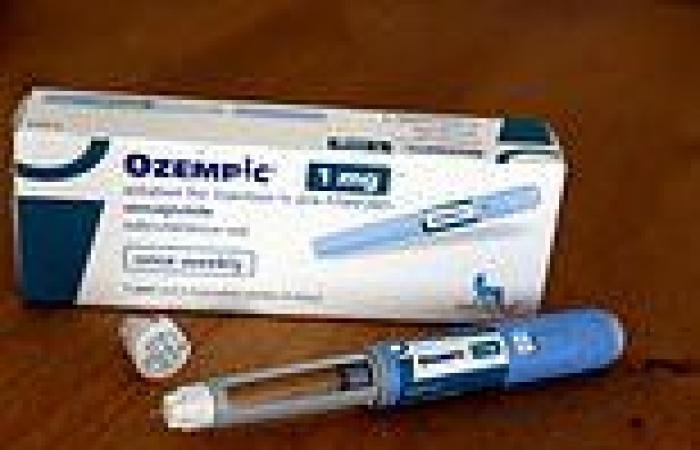Experts reveal why 15 percent of people don't lose weight on Ozempic - could ... trends now
Ozempic and similar fat-burning shots have been a godsend for millions of Americans living with obesity.
At least 5.6 million people across the US have been prescribed the injection to help them slim down and, in doing so, slash their risk of a host of diseases by 20 percent.
The medicine, which works by supressing hunger signals, can help patients lose up to 15 percent in their body weight in just over a year, according to major trials.
But while may have great success dropping pounds, some one in six patients don't in fact any lose weight at all - or lose so little it's barely noticeable.
They are the curious group that some doctors have taken to calling, 'Ozempic non-responders'.
Experts are baffled by this patient group; some of who gain some weight but quickly plateau, while others barely shift anything.
Doctors working in the field believe a combination of genetics, thyroid problems and bad food choices can all work to render the blockbuster medication effectively useless.
Clinical trials of Ozempic, Zepbound, Mounjaro and similar drugs show that about 15 percent of patients are 'non-responders', meaning they lose less than five percent of their body weight over about 68 weeks.
For a 250-pound-man taking the drugs, five percent lost, or twelve and a half pounds, is far lower than the study average of 15 percent lost, or 37 pounds.
Since the conclusion of those trials, some people, including many Reddit users, have said they actually gained weight on the medicines, with one person saying they put on 13 pounds.
TikTok user Shelly eventually dosed up to the highest level of Ozempic for five months - and it still did not work for her.
‘It did quiet the food noise; I didn’t feel like I was thinking about food all the time, but no weight loss. I could still eat like normal, and a lot of acid reflux that I didn’t want anymore.'
She said it was sad for her to have gotten the medication after having gained weight following a leg injury, and still see no weight loss. She did, however, experience a lot of acid reflux.
She is no longer taking a weight loss drug but has instead immersed herself in exercise, especially heavy weight lifting.
Another TikTok user named Viola said: ‘I don’t know why it’s not working for me either it’s making me hungry.’
Another TikToker, Katherine, said she was on Wegovy - which contains the same ingredient as Ozempic - for, 'four or five months, and I didn't lose anything. I stayed steady.
'I'm just maintaining, I've been up and down... the same four or five pounds, basically do not go below a certain number, and I just keep bouncing back and forth.'
She added that she has gotten frustrated about the plateau, especially given that she has struggled with her weight her whole life.
And a Reddit user on the drug said: ‘I started Mounjaro last September and lost 30 pounds in 5 months. In February, I had to switch to Wegovy. They started me at the second lowest dose and I worked up to 2.4. I have gained 5 pounds since February… I also have no appetite suppression.’
Annie, a 40 year-old mother of one from Houston, Texas, told DailyMail.com that she was 'heartbroken' when Ozempic did not help her lose weight like she had expected.
Annie, who weighed 198 pounds in May 2022, had struggled with her weight for years and found nothing worked to drop the weight after she had her first child.
When she broached the topic of taking the medications at an appointment with her doctor, Annie said she was 'very receptive'.
![Dr Gitanjali Srivastava, an obesity specialist at Vanderbilt University [pictured] told DailyMail.com that having an underlying condition like PCOS or certain genetic predispositions could make the drugs work less effectively for those people](https://i.dailymail.co.uk/1s/2024/04/26/17/83859367-13316595-Dr_Gitanjali_Srivastava_an_obesity_specialist_at_Vanderbilt_Univ-a-2_1714150102651.jpg)
Dr Gitanjali Srivastava, an obesity specialist at Vanderbilt University [pictured] told DailyMail.com that having an underlying condition like PCOS or certain genetic predispositions could make the drugs work less effectively for those people
The physician was a South Asian woman like Annie who, like most South Asian women, had a genetic predisposion to diabetes - so she understood her patient's concerns.
Annie was excited. She had seen stories of people losing 20, 30 pounds and felt she was on the cusp of a cure for her obesity, promising to get her healthier to be there for her family.
While she didn't experience the severe nausea that many do, she didn't notice any benefits immediately, either.
Wegovy, Ozempic and Mounjaro are what are known as GLP-1 receptor agonists. Their active ingredient, semaglutide, spurs weight loss by mimicking the actions of GLP-1, or glucagon-like peptide-1, a hormone in the brain that regulates appetite and feelings of fullness.
Once Annie started injecting the drug, she didn’t feel any signs of a suppressed appetite, but developed an extreme aversion to fried foods.
She couldn't go through a fast-food drive-through with her daughter without feeling sick - which helped her shift a couple of pounds per month.
‘But it wasn't the huge numbers that you see other people mentioning, that they lost like 10 pounds a month, or six to seven pounds a month.
'I think the highest I ever got was like four pounds a month. And then since then, it was one pound a month, two pounds a month a month, many months of no weight loss at all.’
She tried to follow a low-carb, high-protein diet and would go on a brisk walk every day on her lunch break for about 45




